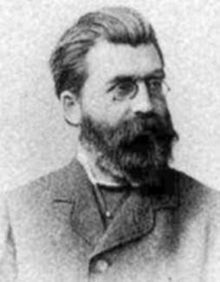Eugene Netto
Eugen Otto Erwin Netto (born June 30, 1846 in Halle ; † May 13, 1919 in Gießen ) was a German mathematician who dealt with combinatorics and group theory.
Live and act
Netto's father was employed by the Francke Foundation in Halle. Netto went to school in Halle and Berlin . From 1866 he studied mathematics at the University of Berlin with Leopold Kronecker , Karl Weierstraß and Ernst Eduard Kummer . He graduated in 1870 and received his doctorate from Weierstraß. He then taught at a grammar school in Berlin before becoming an associate professor at the University of Strasbourg in 1879 . In 1882 he became associate professor in Berlin and in 1888 professor at the University of Giessen . In 1913 he retired.
Netto worked on group theory, among other things, where he gave a new proof of Sylow's theorems . He is known for early textbooks on combinatorics and group theory. He wrote the chapters on combinatorics, probability theory, series, and imaginary in the fourth volume of the lectures on the history of mathematics by Moritz Cantor (1908), which deals with the 18th century.
In 1879 he proved that the bijective mapping of the unit interval onto the unit square by Georg Cantor could not be continuous.
Fonts
- Substitution theory and its application to algebra. Teubner 1882.
- Theory of Substitutions and Its Applications to Algebra. Ann Arbor, Mich. 1892.
- The determinants. Teubner, 1910.
- The determinants. Teubner, 2nd edition 1925.
- Textbook of combinatorics. Teubner, 1901, 2nd edition 1927.
- Group and substitution theory. Leipzig, Göschen, 1908.
- Lectures on algebra. First volume. Teubner, 1896.
- Lectures on algebra. Second volume. Teubner, 1900.
- Net: combinatorics. Encyclopedia of Mathematical Sciences, Vol. 1, 1898.
- Net: Rational functions of a variable; their zeros. Encyclopedia Math.Wiss., Vol. 1, 1899.
- Net: Rational functions of several variables. Encyclopedia Mathem.Wiss., Vol. 1, 1899.
literature
- Albrecht Beutelspacher: Netto, Otto Erwin Johannes Eugen. In: New German Biography (NDB). Volume 19, Duncker & Humblot, Berlin 1999, ISBN 3-428-00200-8 , p. 89 f. ( Digitized version ).
Web links
- John J. O'Connor, Edmund F. Robertson : Eugen Netto. In: MacTutor History of Mathematics archive .
- Mathematics Genealogy Project
- Eugen Netto: Algebra (Service Commun de Documentation de l'Université Louis Pasteur, Strasbourg)
| personal data | |
|---|---|
| SURNAME | Netto, Eugene |
| ALTERNATIVE NAMES | Netto, Otto Erwin Eugen; Netto, Eugenius |
| BRIEF DESCRIPTION | German mathematician |
| DATE OF BIRTH | June 30, 1846 |
| PLACE OF BIRTH | Halle (Saale) |
| DATE OF DEATH | May 13, 1919 |
| Place of death | to water |
